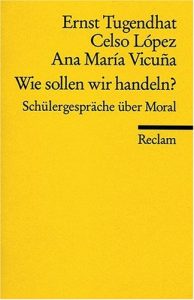What is the worst crime? Are we always obliged to help others? Why is punishment sometimes necessary? What is the sense of life?
These and some other questions are the subject of a small book on ethics, written by the philosopher Ernst Tugendhat and the two experienced teachers and writers Celso López, and Ana Maria Vicuña. The book was originally written in 1995 for an ethics course in Chile, and it has a similar target as the books of Matthew Lipman for school children of thirteen to fifteen years.
Manuel, Camila and some of their friends go to school like almost all their peers all over the world. And they come along many situations, either personally in school, family or in the circle of friends, or by reports in the media, that touch ethical questions and lead to discussions among them, but also with their parents, teachers, or the trusted kind school librarian Senor Ibarra. The form of the dialogue, embedded in a small story, makes it an easy and entertaining read and makes it also more easy to follow the lines of argumentation. This open form also encourages the reader not to be content with the presented arguments, but to rethink the discussed question and find her/his own opinion and answers on it.
One of the best introductions to ethics for young people that I know of. Highly recommended for translation into English (the book is available in Spanish and German).
Ernst Tugendhat, Celso López, Ana María Vicuña: El libro de Manuel y Camila, Editorial Gedisa 2001; Wie sollen wir handeln?, Philipp Reclam, 2000
© Thomas Hübner and mytwostotinki.com, 2014. Unauthorized use and/or duplication of this material without expressed and written permission from this blog’s author and/or owner is strictly prohibited. Excerpts and links may be used, provided that full and clear credit is given to Thomas Hübner and mytwostotinki.com with appropriate and specific direction to the original content.




 Facebook
Facebook RSS
RSS Twitter
Twitter